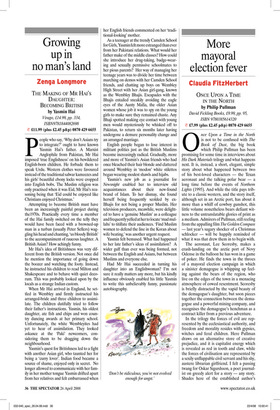More mayoral election fever
Claudia FitzHerbert
ONCE UPON A TIME IN THE NORTH by Philip Pullman David Fickling Books, £9.99, pp. 95, ISBN 9780385614320 ✆ £7.99 (plus £2.45 p&p) 0870 429 6655 Once Upon a Time in the North is not to be confused with The Book of Dust, the big book which Philip Pullman has been promising for some time in interviews about His Dark Materials trilogy and what happens next. It is, instead, a short, elegant, simple story about what happened between two of his best-loved characters — the Texan aeronaut and the talking polar bear — a long time before the events of Northern Lights (1995). And while the title pays tribute to a classic western, and the story itself, although set in an Arctic port, has about it more than a whiff of cowboy gunshot, this little volume nonetheless bears defiant witness to the untranslatable glories of print as a medium. Admirers of Pullman, still reeling from the appalling film The Golden Compass — last year’s sugary shocker of a Christmas schlocker — will be happily reminded of what it was that drew them in to begin with.
The aeronaut, Lee Scoresby, makes a crash-landing on the arctic port of Novy Odense in the balloon he has won in a game of poker. He finds the town in the throes of a mayoral election campaign in which a sinister demagogue is whipping up feeling against the bears of the region, who live on the edges of the town in a menacing atmosphere of cowed resentment. Scoresby is briefly distracted by the vapid beauty of the demagogue’s daughter, but soon pieces together the connection between the demagogue and a powerful mining company, and recognises the demagogue’s henchman as a contract killer from a previous adventure.
In the trilogy the forces of evil are represented by the ecclesiastical authority, and freedom and morality resides with gypsies, witches and feral children. Here Pullman draws on an alternative store of creative prejudice, and it is capitalist energy which is revealed as red in tooth and claw, while the forces of civilisation are represented by a sexily unflappable civil servant and his shy, austere librarian girlfriend. I felt a passing twang for Oskar Sigurdsson, a poet journalist on greedy alert for a story — any story. Shades here of the established author’s habitual dislike of the resourceful hack?
One of the many pleasures of this small, beautifully produced book — cloth-bound, with enchanting woodcuts by the masterengraver John Lawrence — is that daemons are once again restored to their mysterious place in Pullman’s subtly outof-kilter world. These creatures — animal manifestations of their owners’ souls, with forms revealing of their owners’ personality — were, inevitably, reduced to the status of exotic pets in the cinematic version. Here their reactions to events and interactions with their owners mark them out as a rhetorical device of ingenious and elastic power. The contract killer’s account of how he tied his enemy’s daemon to a horse’s tail is as vivid an account of torture as I have read in a long time.











































































 Previous page
Previous page